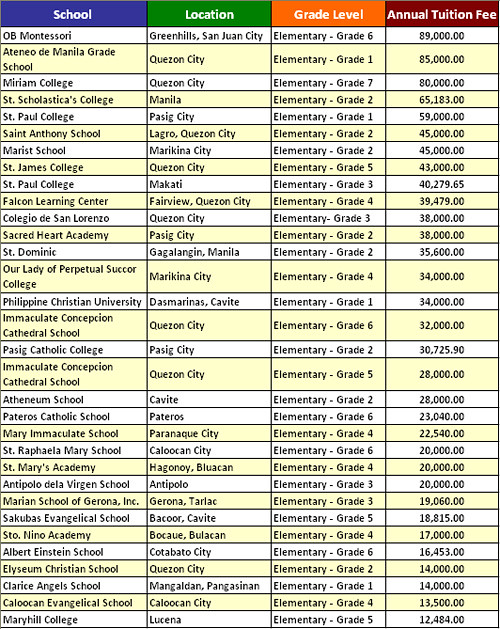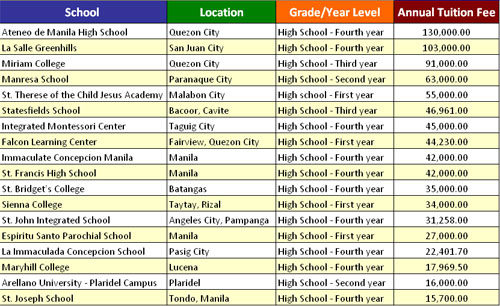Non-tuition fees hide real cost of private education
More than ninety percent of private schools did not declare tuition fee increases this year, including the schools of Carla Mortel's two children. Yet when she enrolled her eldest child, she still paid the school P1,000 more than last year. The increase came not in tuition but in "miscellaneous fees." Of the P22,420 total billings at one of the schools, almost P8,000 was allocated for miscellaneous fees. "You feel kind of helpless about the situation. You just find out about the increase right before you pay," Mortel said. She added that unlike the tuition fee that can be paid on an installment basis, the miscellaneous fees need to be paid during enrollment. A 'trick' by private schools The advocacy group Parents Enabling Parents (PEP) Coalition said that adjusting miscellaneous fees to increase the total school fees is a deliberate move of private schools to increase their fees without having to go through the procedures required for a tuition fee hike. "They've been doing this trick for a long time to cover their fee increase," PEP's president Philip Piccio said. "A consultation with the parents' association is needed if [a school] wants to increase their tuition fee, and they have to declare this to DepEd. If they just increase their miscellaneous fees, they don't have to go through all the rikotitos." He said that parents are often on the losing end and left with no other choice but to just pay for the higher miscellaneous fees. "If you're a parent, you won't just pull out your child from the school just because of the increased miscellaneous fees," he said. "You're tied in. You won't do that." Eva Cruz, a mother of three, said that she's aware of the miscellaneous fees that jack up the total fees that she pays every school year. She paid roughly P42,000 for her daughter's last year of high school at Immaculate Conception Academy in Manila. P9,500 of the total bill was for miscellaneous fees which had to be settled right away. "We are aware of these miscellaneous fees, but you just have to accept it. You can't do anything about it," she said. She said that the increase in these fees are almost inevitable, especially in good private schools. She admitted that she did not even bother to check the breakdown of the miscellaneous fees when she paid for the total tuition fee. Piccio said that PEP has been fighting for regulation that will put a cap on the rate that miscellaneous fees in private schools can be increased. "Somebody's got to regulate it. It's an abuse of most private schools," he said. Caloocan Evangelical School in Caloocan City, where one of Mortel's children is enrolled, is among about 9,000 private schools that did not declare a tuition fee increase for the upcoming school year but charged 10% higher miscellaneous fees. "Of course we have to increase our miscellaneous fees because our school's expenses for electricity, water and other utilities increase as well," Assistant Principal Ruth Castro said in a mix of English and Filipino. "The miscellaneous fees we collect from our students are used to defray expenses that also increase beyond our control." "I don't think it's an abuse on the part of private schools," she explained. "We use the additional miscellaneous fees we collect to pay for new air conditioners, free purified water that we provide the students, and the improvement of our computer room and library. It goes back to the students." Miscellaneous fees are unregulated by DepEd Tuition is regulated by the Department of Education, which can disapprove tuition increase applications. But miscellaneous fees fall below the government's radar and are meant to cover a range of services the school provides outside of classroom instruction, including air-conditioning, free drinking water, and field trips. Miscellaneous fees can be added without the knowledge of the authorities. Thus, the Deped cannot say how many schools increased their miscellaneous fees. In effect, private schools can increase their total charges without declaring tuition fee increases, which are often a volatile issue that can prompt student protest and negative publicity for a school. The DepEd reports that less than 10% of the 9,995 private schools nationwide applied for tuition fee increases for school year 2010-2011, yet anecdotal evidence shows that many private schools -- nobody can say exactly how many -- increased costs they charge students' parents. Private schools' fees have two components: the basic tuition fee, which pays for the actual classes that a student takes, and miscellaneous fees, which pay for activities and facilities outside the classroom. Other miscellaneous fees include parent-teacher association (PTA) membership, newsletter and school paper subscriptions, retreats, and diploma and yearbook payments for graduating students. DepEd Undersecretary Ramon Bacani clarified that the application for tuition fee increase pertains to the "tuition fee" component of the total fee and not the miscellaneous fees. So while only 107 out of 1,937 private elementary and secondary schools in Metro Manila applied for tuition fee increases, the rest of the schools that did not declare a tuition fee increase may still charge fees higher than what they charged the previous year. "As long as the miscellaneous fees are 'justified' to the parents and used for their intended allocation, [private schools may] increase their miscellaneous fees," he said. However, if schools can increase miscellaneous fees without informing the DepEd, authorities themselves will have no basis to know if the fee increases are indeed "justified".  Tuition and miscellaneous fees do not cover other major expenses of education such as books, school uniforms, and school supplies. Online frustration about tuition fees Enrollment in private schools started as early as May, and some parents who already paid for their children's tuition fees released their frustration and found consolation online. On GMANews.TV's Facebook fan page, a shout-out was posted to ask about the tuition fees that our readers paid for the incoming school year. The responses came from all over the country, showing the range of private schools' tuition fees from different cities and provinces. (Most of the responses were rounded off by most respondents. The figures quoted represent the total tuition fee, including miscellaneous fees.)
Tuition and miscellaneous fees do not cover other major expenses of education such as books, school uniforms, and school supplies. Online frustration about tuition fees Enrollment in private schools started as early as May, and some parents who already paid for their children's tuition fees released their frustration and found consolation online. On GMANews.TV's Facebook fan page, a shout-out was posted to ask about the tuition fees that our readers paid for the incoming school year. The responses came from all over the country, showing the range of private schools' tuition fees from different cities and provinces. (Most of the responses were rounded off by most respondents. The figures quoted represent the total tuition fee, including miscellaneous fees.)  A year or two of preparatory school is recommended (and sometimes required) for four- to five-year-old children before entering the first grade. Classes range from two to four hours, and some schools also open classes for children as young as two years old. Some preparatory schools, like the Golden Angels Super Learning Center in San Juan City, advertise their school as the best preparation for the exclusive 'big schools' in Metro Manila. Golden Angels Super Learning Center, the most expensive school on our list, charges as much as P105,000.00 per student for one school year.
A year or two of preparatory school is recommended (and sometimes required) for four- to five-year-old children before entering the first grade. Classes range from two to four hours, and some schools also open classes for children as young as two years old. Some preparatory schools, like the Golden Angels Super Learning Center in San Juan City, advertise their school as the best preparation for the exclusive 'big schools' in Metro Manila. Golden Angels Super Learning Center, the most expensive school on our list, charges as much as P105,000.00 per student for one school year.  Hazel Manaloto, whose daughter is a student in Pasig Catholic College, posted that she paid roughly P31,000.00 for her second grader's tuition fee. She said in a phone interview that it took months to prepare for this amount. "It's my husband who works and I'm a stay-at-home mother. We started saving up for the tuition fee even before the vacation season," she said. She added that the amount does not include expenses for books, uniforms and other supplies, and that she is also sending another child to preparatory school. Generally, schools in Metro Manila are more expensive compared to schools in the provinces. More popular schools like St. Scholastica's College, Miriam College and OB Montessori charge as much as P80,000 to P90,000 for a ten-month academic year.
Hazel Manaloto, whose daughter is a student in Pasig Catholic College, posted that she paid roughly P31,000.00 for her second grader's tuition fee. She said in a phone interview that it took months to prepare for this amount. "It's my husband who works and I'm a stay-at-home mother. We started saving up for the tuition fee even before the vacation season," she said. She added that the amount does not include expenses for books, uniforms and other supplies, and that she is also sending another child to preparatory school. Generally, schools in Metro Manila are more expensive compared to schools in the provinces. More popular schools like St. Scholastica's College, Miriam College and OB Montessori charge as much as P80,000 to P90,000 for a ten-month academic year.  All-boys schools Ateneo de Manila and La Salle Greenhills charge more than P100,000 for a year in high school. The least expensive high schools on the list charge P20,000 a year, much cheaper than their 'exclusive' counterparts but still more expensive compared to secondary public schools that are not supposed to charge any fees at all (although some public schools have been reported to be charging unauthorized fees). Facebook user Angel Alegre posted that not all schools charging exorbitant tuition fees "offer quality education." He added that Filipinos are fixated with so-called "elite" schools. However, most parents would agree that a good education is the one thing parents can bequeath to their children that nobody can take away. "Sending kids to school and paying for tuition nowadays is no joke," Hazel Manaloto said in Filipino. "But it's the best thing you can do for your kids." - HS, GMANews.TV
All-boys schools Ateneo de Manila and La Salle Greenhills charge more than P100,000 for a year in high school. The least expensive high schools on the list charge P20,000 a year, much cheaper than their 'exclusive' counterparts but still more expensive compared to secondary public schools that are not supposed to charge any fees at all (although some public schools have been reported to be charging unauthorized fees). Facebook user Angel Alegre posted that not all schools charging exorbitant tuition fees "offer quality education." He added that Filipinos are fixated with so-called "elite" schools. However, most parents would agree that a good education is the one thing parents can bequeath to their children that nobody can take away. "Sending kids to school and paying for tuition nowadays is no joke," Hazel Manaloto said in Filipino. "But it's the best thing you can do for your kids." - HS, GMANews.TV





